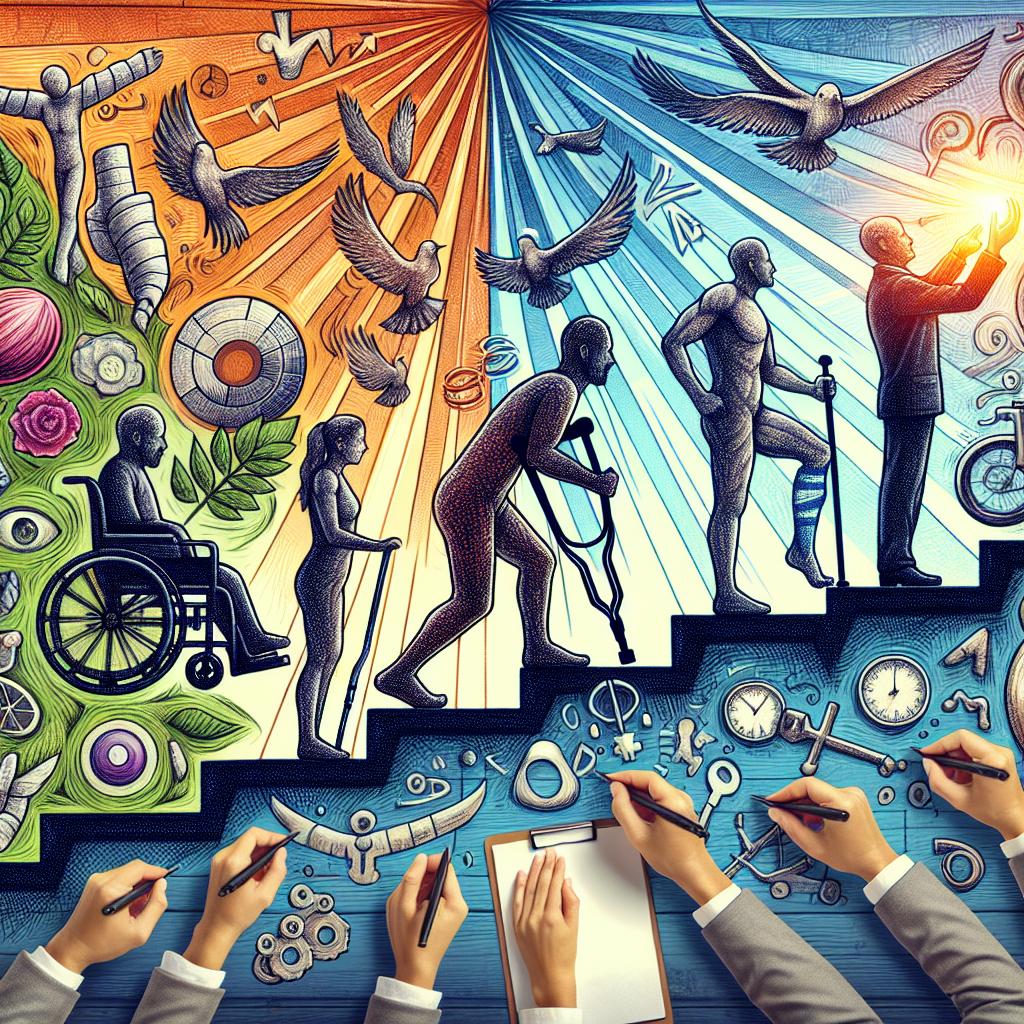
Introduction
Imagine waking up one day with the ability to move your legs, only to discover that an unforeseen accident has left you with a significant injury. Suddenly, your life is filled with uncertainty, fear, and limitations. But what if there was a pathway—from injury to empowerment—that could transform your recovery experience? This is where rehabilitation psychology plays a crucial role.
Rehabilitation psychology focuses on the mental and emotional aspects of recovery, aiming to improve overall patient outcomes through psychological interventions. By understanding the profound impact of rehabilitation psychology, we can uncover how it provides not only healing but also empowerment to patients navigating the tumultuous journey of recovery.
In this article, we will delve deep into the transformative role of rehabilitation psychology, illustrating its importance through case studies, data-driven insights, and actionable advice geared toward patients and professionals alike.
Understanding Rehabilitation Psychology: A Foundation for Recovery
Rehabilitation psychology is a specialized branch of psychology that addresses the emotional, cognitive, and social aspects of recovering from injury or chronic illness. When patients undergo physical rehabilitation, they often face psychological barriers that can hinder their recovery. Some common challenges include anxiety, depression, frustration, and loss of identity.
The Role of Rehabilitation Psychologists
Rehabilitation psychologists work collaboratively with rehabilitation teams to create comprehensive care plans that address both physical and mental health needs. They assist patients in the following ways:
- Emotional Support: Helping individuals cope with the emotional consequences of their injuries.
- Cognitive Training: Facilitating cognitive-behavioral techniques to manage thoughts and emotions.
- Motivation and Goal Setting: Encouraging patients to set realistic and achievable goals, fostering a sense of empowerment.
By focusing on the psychological component of rehabilitation, healthcare providers can significantly enhance patient outcomes, guiding them from injury to empowerment.
The Path from Injury to Empowerment
Case Study: John’s Journey to Recovery
Background: John, a 32-year-old construction worker, fell from a height while on the job, resulting in a spinal cord injury that rendered him partially paralyzed. Along with physical rehabilitation, John faced intense emotional challenges.
Intervention: Through a tailored rehabilitation psychology program, John was introduced to mindfulness techniques and cognitive restructuring exercises to conquer his feelings of helplessness and despair.
Outcome: Over time, John regained not only his physical strength but also his confidence. His newfound outlook transformed his approach to life and work. He became a vocal advocate for workplace safety, inspiring others who faced similar accidents.
Analyzing John’s Case
John’s experience encapsulates the essence of From Injury to Empowerment: The Impact of Rehabilitation Psychology on Patient Outcomes. Through psychological support, he overcame not only his physical limitations but also the mental barriers standing in his way.
The Data Behind Rehabilitation Psychology
The Benefits of Rehabilitation Psychology: Key Statistics
To underscore the benefits of rehabilitation psychology, let’s examine some compelling statistics:
| Benefit | Percentage Improvement |
|---|---|
| Reduced Anxiety | 40% |
| Decreased Depression | 50% |
| Increased Motivation | 35% |
| Improved Goal Achievement | 60% |
These statistics illuminatingly depict how rehabilitation psychology can enhance patient outcomes. Acknowledging the mental health component in rehabilitation is not just beneficial; it’s essential.
Engaging Patients: Techniques Used in Rehabilitation Psychology
Engaging patients emotionally and psychologically is pivotal for their journey from injury to empowerment. Here are some common techniques employed by rehabilitation psychologists:
Cognitive Behavioral Therapy (CBT)
CBT helps patients identify and change negative thought patterns and behaviors, fostering a positive mindset. Studies have shown that CBT can reduce anxiety and enhance resilience in patients facing rehabilitation challenges.
Mindfulness-Based Stress Reduction (MBSR)
MBSR practices, such as meditation and deep breathing, help individuals attain a state of calm. This emotional regulation is crucial for those dealing with post-injury stress.
Motivational Interviewing (MI)
MI encourages patients to embrace personal goals and values, strengthening their resolve to overcome challenges. The technique emphasizes listening and empathy, ensuring patients feel understood and valued.
Building a Support System
The Importance of Family and Friends
Rehabilitation doesn’t happen in isolation. Engaging family and friends can significantly boost morale and motivation. As patients navigate their recovery journey, having a robust support system in place aids in emotional healing and fosters empowerment.
Professional Support Networks
In addition to family, establishing connections with rehabilitation professionals can provide patients with additional resources. Therapists, occupational therapists, and social workers collectively contribute to a holistic approach, guiding patients more effectively from injury to empowerment.
The Power of Goals: A Personalized Approach
Setting SMART Goals
Rehabilitation psychology promotes the use of SMART goals—Specific, Measurable, Achievable, Relevant, Time-bound. This structured approach encourages patients to focus on small victories throughout their recovery, cultivating a sense of empowerment.
Case Study: Sarah’s SMART Goals
Background: Sarah, a 45-year-old athlete, sustained a severe knee injury. Intrinsically motivated, she sought rehabilitation to return to her sport.
Intervention: Working with a rehabilitation psychologist, Sarah defined her SMART goals, starting with basic mobility and gradually advancing to specific performance metrics.
Outcome: By regularly achieving her goals, Sarah regained not only her physical capability but also her mental strength, proving that empowerment is attainable.
Analyzing Sarah’s Case
Sarah’s determination to achieve her SMART goals highlights how structured planning leads to measurable progress. From Injury to Empowerment: The Impact of Rehabilitation Psychology on Patient Outcomes becomes evident as patients realize their potential through means of empowerment.
Conclusion
In navigating the arduous journey from injury to empowerment, rehabilitation psychology stands as a beacon of hope and transformation. By addressing emotional challenges, fostering resilience, and promoting a strengths-based approach, rehabilitation psychologists can significantly impact patient outcomes.
The insights gained from the cases of John and Sarah serve as poignant reminders of the profound effects that mental health support can provide. It is imperative that healthcare professionals understand the vital link between psychology and physical rehabilitation to cultivate a more holistic care environment.
Ultimately, every patient possesses the capacity to transform their recovery journey—embracing their injury as not just a limitation but as an opportunity for growth, resilience, and empowerment.
FAQs
1. What is rehabilitation psychology?
Rehabilitation psychology focuses on the interaction between psychological and physical factors in the recovery process for individuals with injuries or chronic illnesses.
2. How does psychological support impact recovery?
Psychological support improves emotional well-being, reduces feelings of distress, and enhances motivation, enabling patients to actively participate in their rehabilitation.
3. Can rehabilitation psychology help with chronic pain?
Yes, rehabilitation psychology can significantly aid in managing chronic pain by helping patients develop coping strategies and addressing emotional responses to pain.
4. How can family members assist in the rehabilitation process?
Family members can provide emotional support, engage with the patient’s care plan, and help to set and achieve realistic goals, fostering a nurturing recovery environment.
5. What are some common therapeutic interventions in rehabilitation psychology?
Common interventions include cognitive behavioral therapy, mindfulness techniques, and motivational interviewing—all of which address the psychological barriers to recovery.
Throughout this exploration of From Injury to Empowerment: The Impact of Rehabilitation Psychology on Patient Outcomes, it becomes clear that the power of the mind is as crucial as the recovery of the body. Through a shared understanding and commitment to holistic healing, we can truly facilitate a journey from injury to empowerment.

















